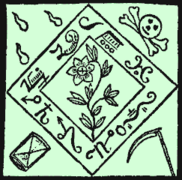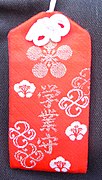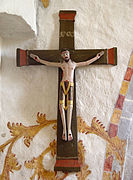talisman
English
Etymology
From French talisman, partly from Arabic طِلَسْم (ṭilasm), from Ancient Greek τέλεσμα (télesma, “payment”); and partly directly from Byzantine Greek τέλεσμα (télesma, “talisman, religious rite, completion”), from τελέω (teléō, “to perform religious rites, to complete”), from τέλος (télos, “end, fulfillment, accomplishment, consummation, completion”).
Pronunciation
Noun
talisman (plural talismans)
- A magical object providing protection against ill will, or the supernatural, or conferring the wearer with a boon such as good luck, good health, or power(s).
- 1997, John Peel, chapter 10, in War of the Daleks, page 233:
- She kept low, clutching the rifle she'd taken as though it were a magic talisman, as if it would somehow protect her even though she didn't fire it.
- 1956, Delano Ames, chapter 17, in Crime out of Mind[1]:
- Dagobert gave him back his passport. He re-pocketed it indifferently; a talisman which had lost its potency.
- 1916, Frank Baum, chapter 1, in Rinkitink in Oz:
- I have in my possession three Magic Talismans, which I have ever guarded with utmost care, keeping the knowledge of their existence from anyone else.
- 2018 January 1, Donald McRae, “The Guardian footballer of the year 2017: Juan Mata”, in the Guardian[2]:
- Mata would soon whip in the cross that allowed Drogba to equalise – and Chelsea went on to win the Champions League, beating the German club on penalties, with their talisman from the Ivory Coast making history with the final spot-kick.
Derived terms
- talismen (non-standard plural)
See also
Translations
|
Gallery
-
An amulet from the Black Pullet grimoire.
-
Ancient Egyptian ibis-headed Thoth amulet, New Kingdom, Dynasty XVIII, c. 1539-1292 BC.
-
Drawing of clay amulet unearthed near Tartaria, Romania.
-
A crucifix, considered in Christian tradition as a defense against demons.
-
A Nasrani (Saint Thomas Christians of Kerala) gold Thaali, also known as minnu or mangalasutra elsewhere in India, sign of conjugal union worn around neck of the bride
Anagrams
Danish
Etymology
From Arabic طِلَسْم (ṭilasm), from Greek τέλεσμα (télesma).
Noun
talisman c (singular definite talismanen, plural indefinite talismaner)
Inflection
| common gender |
Singular | Plural | ||
|---|---|---|---|---|
| indefinite | definite | indefinite | definite | |
| nominative | talisman | talismanen | talismaner | talismanerne |
| genitive | talismans | talismanens | talismaners | talismanernes |
See also
References
Dutch
Etymology
Borrowed from French talisman, from Arabic طِلَسْم (ṭilasm), from Ancient Greek τέλεσμα (télesma).
- 1644, Johan de Brune, de Jonge, Wetsteen der vernuften, publ. by Iacob Lescaille, page 46.
- […] d'Arabiers geven 'er de naam van Talisman aan; gelijk Scaliger in zijn Fransche brieven getuigt.
- […] the Arabs give to it the name of Talisman; like Scaliger attests in his French letters.
Pronunciation
Noun
talisman m (plural talismans or talismannen, diminutive talismannetje n)
French
Noun
talisman m (plural talismans)
Hyponyms
Descendants
- → Catalan: talismà
- → English: talisman
- → Galician: talismán
- → Portuguese: talismã
- → Spanish: talismán
Further reading
- “talisman”, in Trésor de la langue française informatisé [Digitized Treasury of the French Language], 2012.
Serbo-Croatian
Etymology
From French talisman or Spanish talismán.
Pronunciation
Noun
talìsmān m (Cyrillic spelling талѝсма̄н)
Declension
| singular | plural | |
|---|---|---|
| nominative | talìsmān | talismani |
| genitive | talismána | talismana |
| dative | talismanu | talismanima |
| accusative | talisman | talismane |
| vocative | talismane | talismani |
| locative | talismanu | talismanima |
| instrumental | talismanom | talismanima |
References
- “talisman” in Hrvatski jezični portal
- English terms derived from French
- English terms derived from Arabic
- English terms derived from Ancient Greek
- English terms derived from Byzantine Greek
- English 3-syllable words
- English terms with IPA pronunciation
- English terms with audio links
- English lemmas
- English nouns
- English countable nouns
- English terms with quotations
- Danish terms derived from Arabic
- Danish terms derived from Greek
- Danish lemmas
- Danish nouns
- Danish common-gender nouns
- Dutch terms borrowed from French
- Dutch terms derived from French
- Dutch terms derived from Arabic
- Dutch terms derived from Ancient Greek
- Dutch terms with quotations
- Dutch terms with IPA pronunciation
- Dutch terms with audio links
- Dutch lemmas
- Dutch nouns
- Dutch nouns with plural in -s
- Dutch nouns with plural in -en
- Dutch masculine nouns
- French lemmas
- French nouns
- French countable nouns
- French masculine nouns
- Serbo-Croatian terms derived from French
- Serbo-Croatian terms derived from Spanish
- Serbo-Croatian terms with IPA pronunciation
- Serbo-Croatian lemmas
- Serbo-Croatian nouns
- Serbo-Croatian masculine nouns






